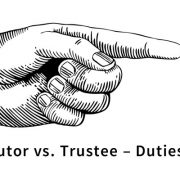Changes in Ohio Power of Attorney Laws
Changes in Ohio Power of Attorney Laws
If you’re an Ohio resident concerned with the estate plan or medical care of a loved one, you should be familiar with Ohio’s laws regarding power of attorney. Cleveland, Ohio estate planning attorney Dan A. Baron offers the following:
What is a financial power of attorney?
A financial power of attorney (POA) is a legal document an individual (the “principal”) can use to appoint someone (the “agent”) to act on his or her behalf. This authority can be used for financial, business, and health matters. Most often, this authority is used when an individual becomes unable to handle his or her own affairs. However, a POA can be used for other matters such as taking care of business matters. A principal can name one agent, or two or more co-agents, each of whom can act alone, unless the POA states otherwise. The POA might allow for each agent to act independently, or as a group.
Changes in Ohio law
Effective March 22, 2012, Ohio adopted new laws regarding power of attorneys. Ohio’s Uniform Power of Attorney Act, or UPOAA, focuses on preventing financial elder abuse. The law now includes a statutory form with language designed to help prevent agents from abusing their power. Put simply, the law now demands POA’s to be more specific. For example, third parties such as a financial institution are not required to honor a general POA. Now, the law asks that a POA includes specifically which types of assets and accounts the agent is allowed to control.
Ohio provides a statutory form that includes language designed to help prevent agents from abusing their power. This form can be found in Ohio Revised Code 1337.60. The form lists actions that an agent may or may not take and includes a section called “Important Information for Agent.” The principal can simply check the box of the powers he or she wishes to designate. It’s important to consult with an attorney when implementing one of these forms into your estate plan.
A power of attorney created before March 22, 2012 will still be valid; however, as an attorney to review it in light of the current law and consider using the 2012 statutory POA form. In sum, UPOAA prohibits agents from performing certain acts unless the POA specifically authorizes them. Because financial POA documents give significant powers to another person, they should be granted only after careful consideration.
To learn more about drafting a power of attorney, contact the law office of Baron Law LLC. You will speak directly with Cleveland, Ohio attorney, Dan Baron. Call today at 216-573-3723 to learn more about how Baron Law can help create your estate plan and power of attorney.











